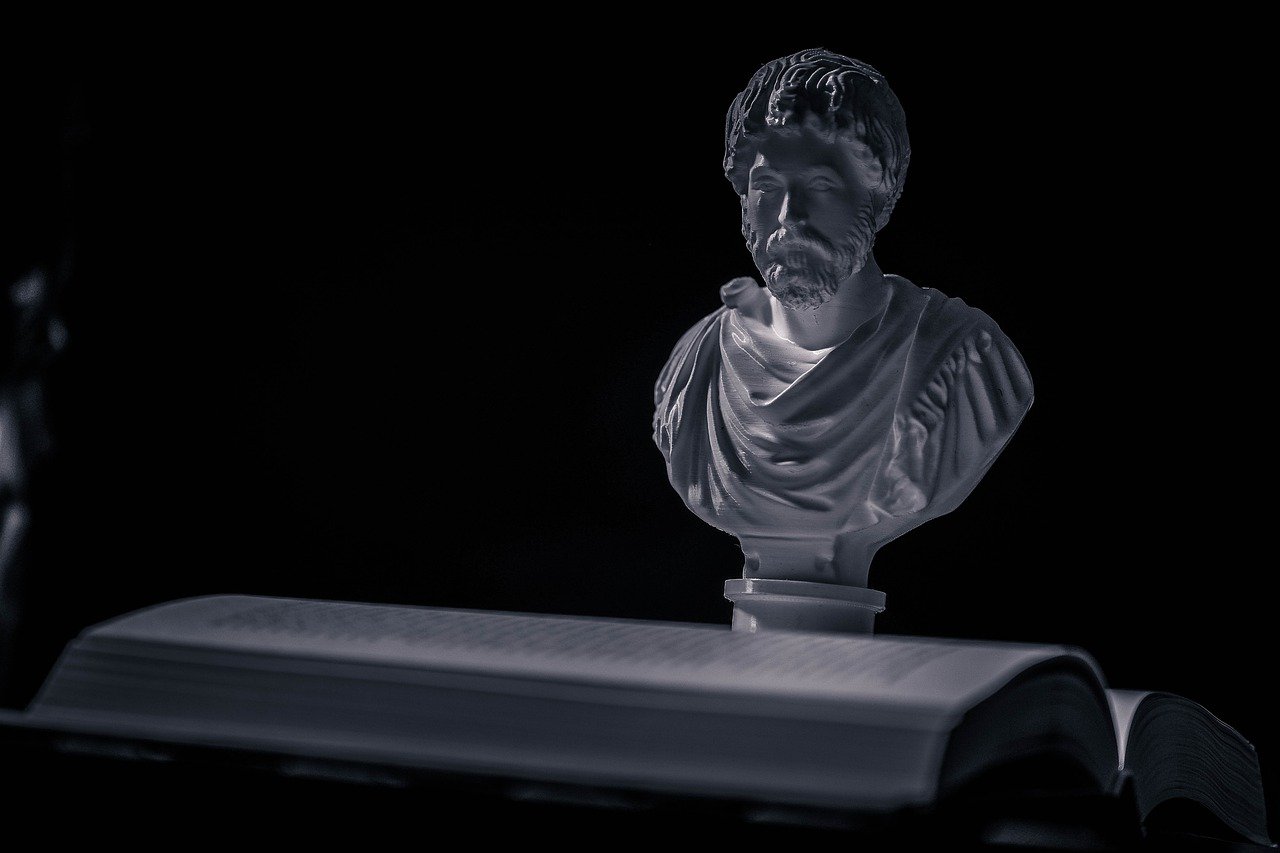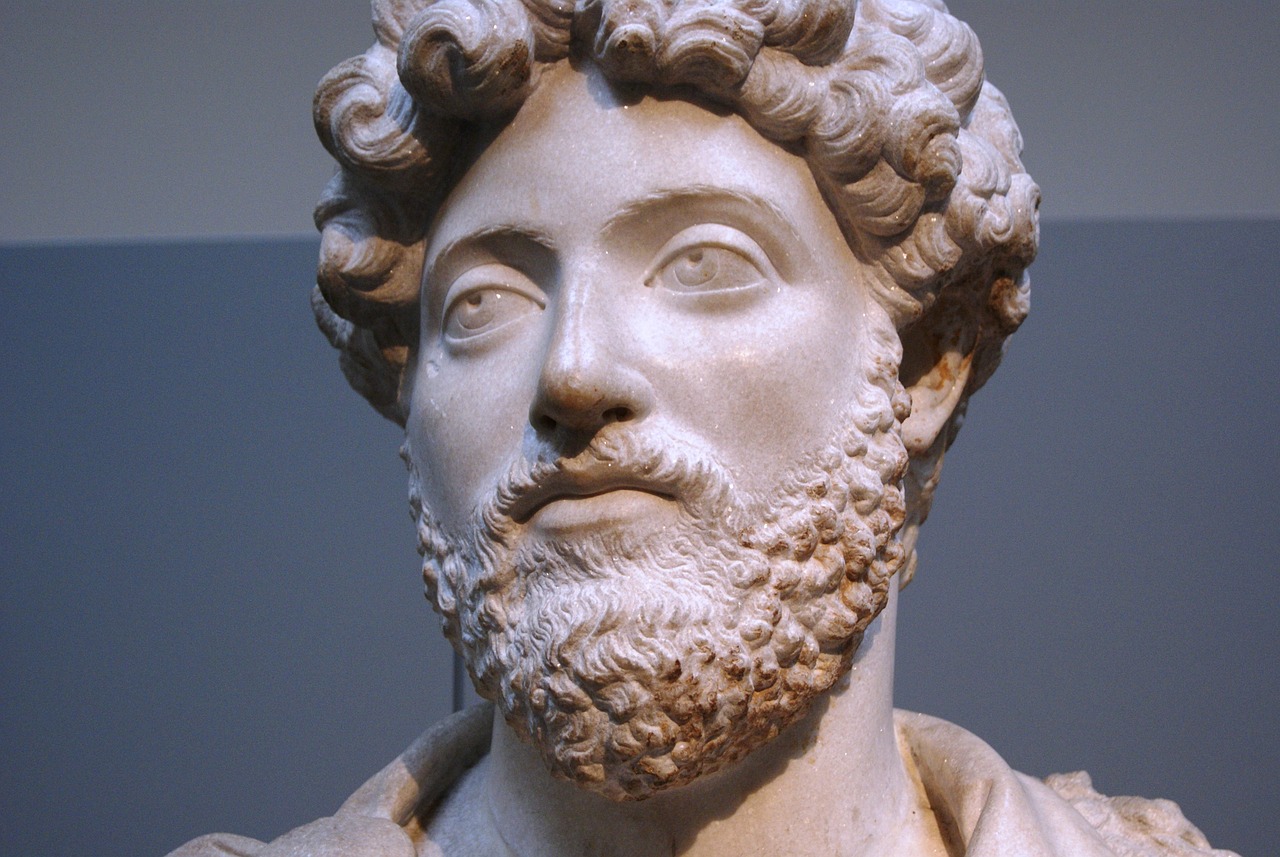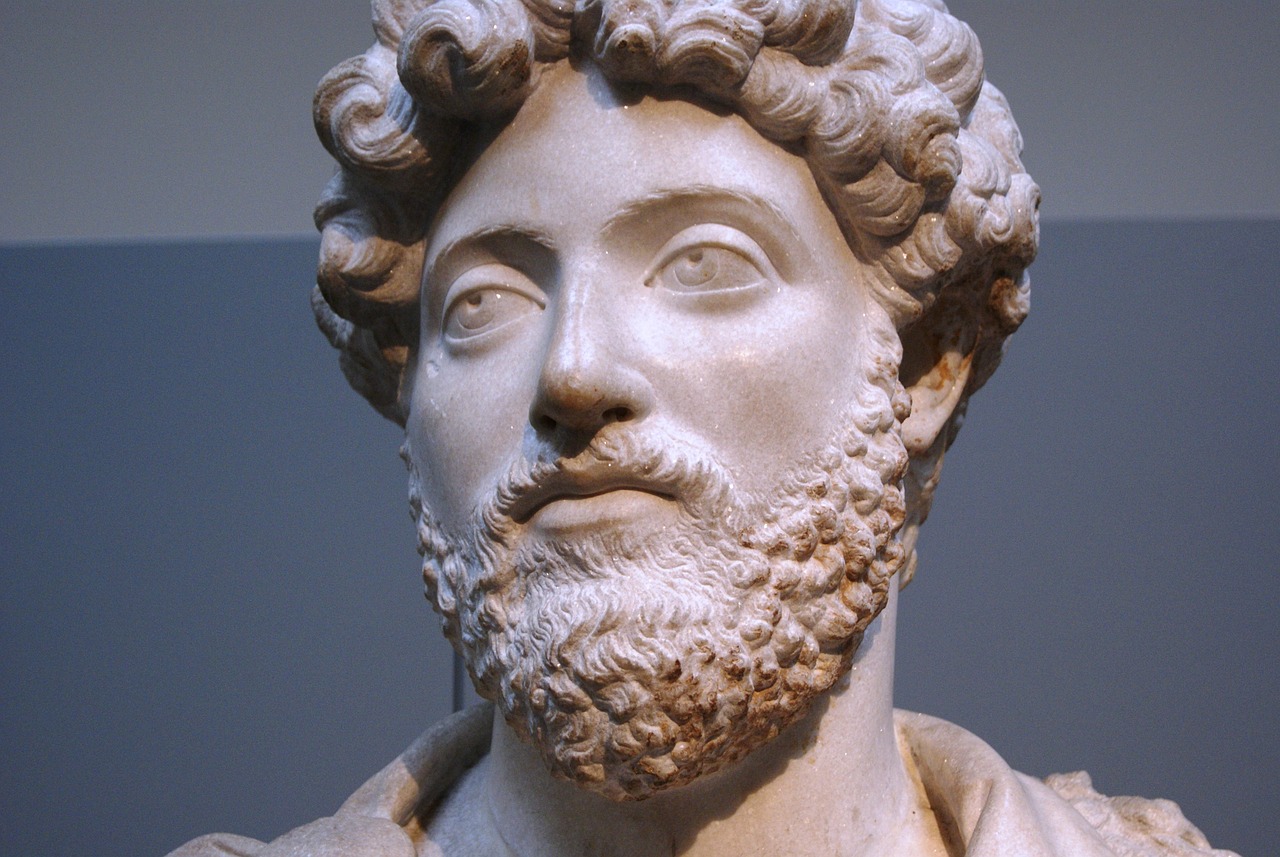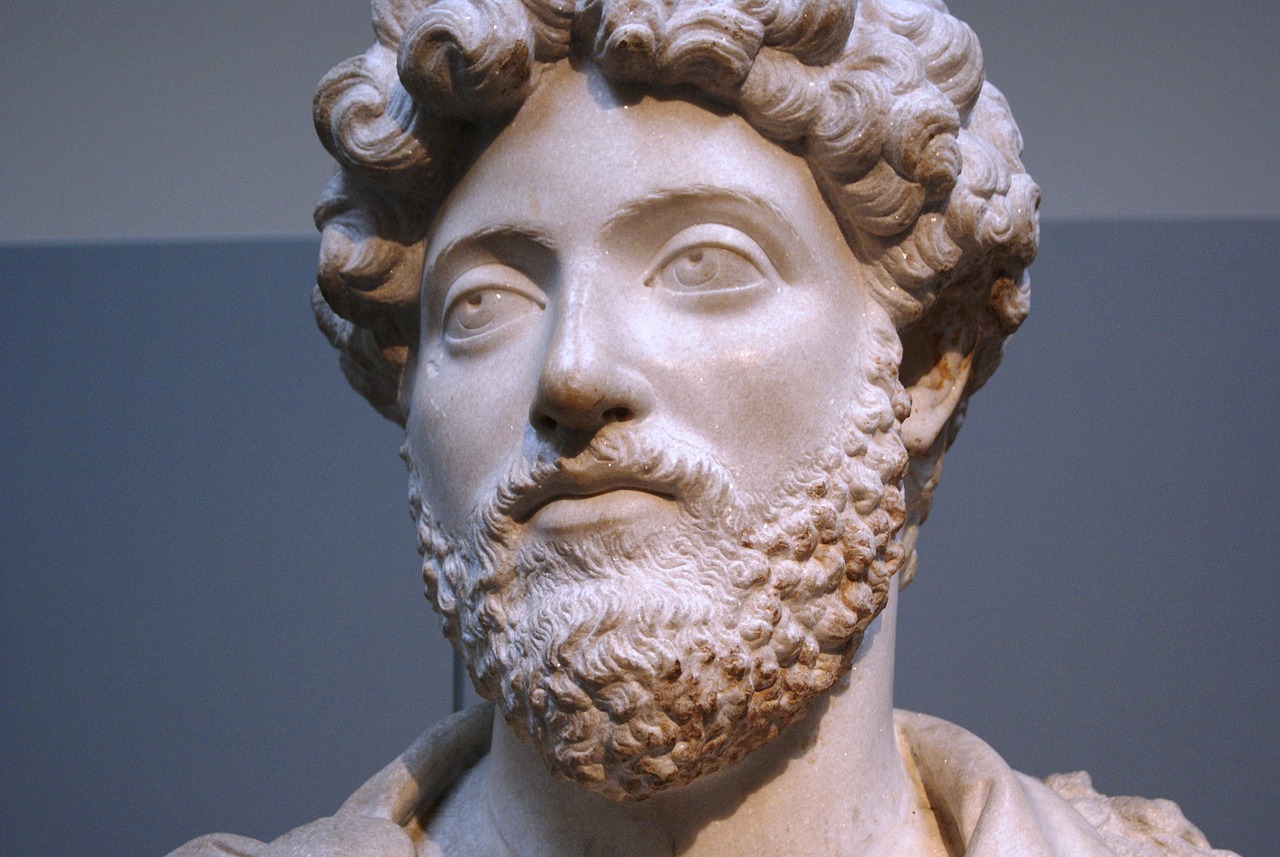Who was Marcus Aurelius and Why is His Philosophy Still Relevant?
Marcus Aurelius, often hailed as one of the greatest Roman Emperors, was not just a ruler but also a profound thinker whose insights into life and leadership resonate even today. Born in 121 AD, he rose to power during a tumultuous period in Roman history, yet his reign was marked by a commitment to duty and a quest for wisdom. What sets him apart from other leaders of his time is his dedication to Stoic philosophy, which emphasizes rationality, self-control, and virtue. But what exactly does this mean for us today? Why should we care about the thoughts of a man who lived nearly two millennia ago?
To understand Marcus Aurelius's relevance, we must first look at the man himself. He was raised in a privileged environment, receiving an education that included rhetoric, philosophy, and the arts. His upbringing instilled in him a sense of responsibility towards his people and the empire. However, it was the philosophical teachings he encountered, especially Stoicism, that profoundly shaped his worldview. Stoicism teaches that while we cannot control external events, we can control our responses to them. This idea is crucial in our fast-paced, often chaotic modern lives.
Imagine facing the daily grind of work, relationships, and societal pressures. How often do we feel overwhelmed? Marcus Aurelius's writings remind us that we can find peace amidst the chaos by focusing on what we can control—our thoughts and actions. His personal reflections, compiled in a work known as The Meditations, serve as a guide for self-improvement and resilience. In this text, he shares his struggles and victories, making it a relatable companion for anyone seeking to navigate their own challenges.
So, why is Stoicism still relevant today? In an era where mental health issues are on the rise and stress is an everyday companion, the principles laid out by Marcus Aurelius offer a beacon of hope. They encourage us to embrace acceptance and understand that life is filled with ups and downs. By learning to detach from the outcomes of our efforts and focusing on our duties, we can cultivate a sense of inner peace that many of us are desperately seeking.
Moreover, Marcus Aurelius’s philosophy extends beyond personal well-being; it has practical applications in leadership and business. His emphasis on ethical decision-making, empathy, and resilience can guide modern leaders in creating healthier work environments and fostering strong team dynamics. In essence, his teachings provide a roadmap for navigating the complexities of both personal and professional life.
As we delve deeper into the life of Marcus Aurelius and the teachings of Stoicism, we will uncover the timeless wisdom that continues to inspire countless individuals. From personal growth to leadership, the relevance of his philosophy is undeniable. So, let’s embark on this journey together and explore how we can apply these ancient principles to our modern lives.
- What is Stoicism? Stoicism is an ancient Greek philosophy that teaches the development of self-control and fortitude as a means to overcome destructive emotions.
- Why should I read The Meditations? The Meditations offers practical insights and reflections that can help you navigate life's challenges with a balanced mindset.
- How can Stoicism help in modern life? Stoicism provides tools for emotional resilience, helping individuals manage stress and maintain focus on what truly matters.
- Can Stoicism be applied in business? Yes, Stoicism encourages ethical decision-making and emotional intelligence, making it beneficial for leaders and organizations.

Life and Background of Marcus Aurelius
Marcus Aurelius, often hailed as one of the most enlightened rulers in history, was born on April 26, 121 AD, in Rome. His journey from a privileged upbringing to becoming the Emperor of Rome is not just a tale of power, but also a profound exploration of philosophy and self-awareness. Raised in a wealthy family, Marcus was introduced to the world of education at an early age. His tutors included some of the most respected philosophers of the time, which laid the groundwork for his deep appreciation of Stoicism. Can you imagine a young boy, surrounded by the grandeur of Rome, yet being taught to seek wisdom over wealth?
As he grew, Marcus was profoundly influenced by the tumultuous political landscape of his time. The Roman Empire was a vast entity, teetering on the edge of internal strife and external threats. This environment shaped his worldview, instilling in him a sense of duty and responsibility. He was adopted by Antoninus Pius, the then Emperor, which not only elevated his status but also set him on a path of leadership. It's fascinating to think about how destiny can intertwine with personal ambition, isn't it?
Marcus Aurelius's education was rigorous and multifaceted. He studied rhetoric, literature, and philosophy, but it was Stoicism that captured his heart. Stoicism teaches us to remain calm in the face of adversity and to focus on what we can control. This philosophy resonated deeply with Marcus, especially as he faced the challenges of ruling an empire. The lessons he learned during his formative years became the bedrock of his leadership style. His commitment to Stoic principles would guide him through the trials of being an emperor, especially during the Marcomannic Wars, where he had to balance military strategy with the philosophical ideals he cherished.
In his personal life, Marcus was married to Faustina, and together they had several children. However, their family life was not without its challenges, including the loss of several children. These personal tragedies further shaped his understanding of life’s impermanence and the importance of acceptance, a core tenet of Stoicism. The juxtaposition of his public persona as a strong leader and his private struggles paints a complex picture of a man who was both a ruler and a philosopher.
Throughout his life, Marcus Aurelius remained humble despite his immense power. He often referred to himself as a servant of the people, emphasizing the Stoic belief in duty and responsibility. His writings reflect this humility, as he frequently reminded himself of the fleeting nature of life and the importance of living in accordance with virtue. Isn’t it remarkable how someone with such authority chose to view himself as a guardian rather than a ruler?
In summary, Marcus Aurelius's life was a tapestry woven with threads of privilege, education, personal loss, and philosophical inquiry. His background not only shaped his thoughts but also influenced the way he led an empire. As we delve deeper into his Stoic beliefs and the lessons he imparted through his writings, we begin to understand why his philosophy remains so relevant today. After all, who wouldn’t want to navigate the complexities of life with the wisdom of a Roman Emperor?

Stoicism: The Philosophy of Marcus Aurelius
Stoicism, a philosophy that has stood the test of time, is not just a set of abstract ideas but a practical guide to living a meaningful life. At the heart of Stoicism lies the belief that we can achieve peace and contentment through the mastery of our thoughts and emotions. Marcus Aurelius, a prominent Stoic philosopher, and Roman Emperor, exemplified these principles in both his personal and public life. His teachings provide a roadmap for navigating the complexities of existence, emphasizing rationality, self-control, and the importance of virtue.
One of the foundational concepts of Stoicism is the idea of control. Marcus Aurelius taught that while we cannot control external events, we can control our responses to them. This is encapsulated in a famous Stoic saying: "You have power over your mind—not outside events. Realize this, and you will find strength." This perspective encourages individuals to focus on what they can influence, fostering a sense of empowerment and reducing feelings of helplessness.
Another key principle of Stoicism is the notion of virtue as the highest good. For Marcus, living a virtuous life meant aligning one's actions with reason and moral integrity. This emphasis on virtue is not merely theoretical; it serves as a practical guide for daily interactions and decision-making. By prioritizing virtues such as wisdom, courage, justice, and temperance, individuals can cultivate a fulfilling and ethical life.
In his reflections, Marcus often reminded himself of the transient nature of life and the inevitability of change. He wrote, "The universe is change; our life is what our thoughts make it." This acknowledgment of impermanence encourages a mindset of acceptance and resilience. Instead of resisting change, Stoicism advocates embracing it, allowing individuals to adapt and thrive amidst life's challenges.
Moreover, Stoicism teaches the importance of community and the interconnectedness of all people. Marcus Aurelius believed that we are part of a larger whole, and our actions should contribute positively to society. He emphasized that our responsibilities extend beyond ourselves, urging individuals to act with compassion and empathy towards others. This sense of duty fosters a deeper connection with humanity and enhances our collective well-being.
In essence, the philosophy of Marcus Aurelius is not merely an academic pursuit; it is a practical framework for living a meaningful and resilient life. By embracing Stoic principles, we can cultivate emotional intelligence, improve our decision-making, and develop a balanced mindset, all of which are invaluable in today's fast-paced world. As we delve deeper into the teachings of Marcus Aurelius, we uncover timeless wisdom that remains relevant and applicable, offering guidance for personal growth and fulfillment.

The Meditations: A Personal Reflection
The Meditations is not just a book; it’s a window into the mind of one of history’s most remarkable figures, Marcus Aurelius. Written during a time of personal and political turmoil, these reflections serve as a testament to his struggles and triumphs. Imagine being an emperor, tasked with governing an empire while grappling with your own thoughts and emotions. That’s precisely what Marcus did, and through his writings, he provides a raw, unfiltered glimpse into his inner world.
Each entry in The Meditations is like a mini-therapy session where Marcus wrestles with the challenges of life. He explores themes such as impermanence, self-discipline, and the importance of virtue. It’s fascinating to see how he emphasizes the need for rationality and emotional control, which are just as relevant today as they were in ancient Rome. For instance, he often reminds himself that the only thing within his control is his own mind and reactions. This is a powerful lesson for anyone feeling overwhelmed by life's unpredictability.
The beauty of The Meditations lies in its simplicity and accessibility. Marcus’s thoughts are not wrapped in complex philosophy but are instead straightforward and relatable. He writes about the importance of accepting what we cannot change and focusing our energy on what we can influence. This message resonates deeply in our modern lives, where we often feel powerless against external circumstances.
Here are some key themes that emerge from his reflections:
- Acceptance: Embracing reality as it is, rather than how we wish it to be.
- Duty: A commitment to fulfilling our roles and responsibilities with integrity.
- Nature: Understanding our place within the larger tapestry of life.
In essence, The Meditations is a guidebook for navigating the complexities of existence. It teaches us that while we cannot control the world around us, we can control how we respond to it. This perspective is incredibly liberating and offers a sense of peace amidst chaos.
The introspective nature of Marcus's writings encourages readers to reflect on their own lives. By engaging with his thoughts, we are prompted to ask ourselves: How do we respond to challenges? What values guide our decisions? In a society that often prioritizes external achievements, The Meditations reminds us to turn inward and cultivate our character.
Ultimately, Marcus Aurelius’s reflections are not just historical artifacts; they are timeless teachings that continue to inspire and guide us. As we face our own struggles in the modern world, we can turn to his words for comfort and wisdom, proving that even centuries later, the essence of his philosophy remains vibrantly alive.

The Meditations
is more than just a collection of writings; it is a profound glimpse into the mind of one of history's most revered philosophers. Written by Marcus Aurelius during his campaigns as a Roman Emperor, these personal reflections were never intended for publication. Instead, they served as a form of self-examination, a way for him to articulate his thoughts and feelings in the midst of the chaos of leadership and warfare. Imagine flipping through the diary of a great leader, where each page reveals not just strategies for battle, but deep insights into the human condition. That's what offers its readers—a raw, unfiltered look at the struggles and triumphs of a man striving for virtue in a turbulent world.
One of the remarkable aspects of is its timeless quality. Despite being written nearly two millennia ago, its themes resonate with modern readers. Marcus Aurelius discusses the importance of self-discipline, rationality, and the acceptance of fate, concepts that are just as relevant today as they were in ancient Rome. He often reflects on the fleeting nature of life, urging us to embrace the present moment and to live with purpose. This perspective can be likened to a gentle reminder that life is not a rehearsal; each moment is precious and worth cherishing.
In , Marcus Aurelius emphasizes the significance of inner peace and emotional resilience. He writes about the power of the mind to shape our experiences, suggesting that while we cannot control external events, we can control how we respond to them. This idea serves as a powerful antidote to the stress and anxiety that many of us face in our daily lives. By cultivating a Stoic mindset, we can learn to navigate challenges with grace and composure, much like a skilled sailor steering through a stormy sea.
Moreover, the structure of is fascinating. It is divided into 12 books, each containing a series of reflections that range from the deeply philosophical to the intensely personal. This format allows readers to dip in and out of the text, finding wisdom that speaks to them in the moment. Whether you're grappling with feelings of inadequacy, seeking clarity in decision-making, or simply trying to make sense of the world around you, there's something in that can offer guidance.
As we delve deeper into the text, we uncover several key themes that stand out:
- Acceptance: Embracing what we cannot change.
- Duty: Understanding our responsibilities to ourselves and others.
- Nature of Existence: Reflecting on the transient nature of life.
These themes not only reflect Marcus Aurelius's Stoic beliefs but also provide a framework for personal growth and understanding. In a world that often feels overwhelming, serves as a beacon of wisdom, encouraging us to cultivate a mindset of resilience and clarity. Ultimately, it reminds us that while we may not have control over the events that unfold in our lives, we do have control over our thoughts and actions. This realization is liberating and empowering, making the teachings of Marcus Aurelius not just relevant, but essential for navigating the complexities of modern life.
1. What is the main purpose of The Meditations?
The main purpose of The Meditations is to serve as a personal reflection and guide for Marcus Aurelius. It focuses on Stoic philosophy, self-examination, and the pursuit of virtue.
2. How can The Meditations be applied to modern life?
The teachings in The Meditations can be applied to modern life by promoting resilience, emotional intelligence, and a focus on the present moment, helping individuals cope with stress and uncertainty.
3. Why is Stoicism relevant today?
Stoicism is relevant today because it offers practical wisdom for dealing with the challenges of modern life, encouraging individuals to focus on what they can control and to cultivate inner peace.

is a collection of personal writings by Marcus Aurelius. This subheading discusses the themes and lessons found within this influential work, showcasing its introspective nature.
The Meditations is not just a book; it’s a window into the mind of one of history’s greatest rulers and thinkers. Written during the tumultuous times of his reign, this collection of personal writings reveals Marcus Aurelius's innermost thoughts and reflections. Imagine being able to peek into the journal of an emperor, where every entry is a blend of philosophy, self-examination, and practical wisdom. Each passage serves as a reminder of the struggles and triumphs of human existence, making it profoundly relatable even today.
What makes The Meditations so special is its introspective nature. Marcus Aurelius didn’t write these reflections for anyone but himself. They were his way of grappling with the challenges of life, leadership, and mortality. In this sense, the work becomes a personal guidebook, filled with lessons that are not just applicable to his time but resonate deeply in our modern world. The themes he explores are universal, touching on concepts such as acceptance, duty, and the nature of existence.
Throughout the pages, we find Marcus wrestling with the idea of acceptance. He often reminds himself that we cannot control the events that happen to us, but we can control how we respond to them. This notion is a cornerstone of Stoic philosophy and serves as a powerful lesson for anyone facing adversity. Imagine facing a challenging situation at work or in your personal life; Marcus’s insights encourage us to focus on our reactions rather than the circumstances themselves.
Another key theme in The Meditations is the concept of duty. Marcus frequently reflects on his responsibilities as a leader and the importance of serving others. He emphasizes that true fulfillment comes from fulfilling our roles with integrity and purpose. This idea prompts us to consider our own responsibilities—whether in our careers, families, or communities—and how we can approach them with a sense of dedication and honor.
Furthermore, Marcus delves into the nature of existence, pondering the transient nature of life and the inevitability of death. His thoughts on mortality are not morbid; rather, they serve as a powerful reminder to live fully and mindfully. By contemplating our mortality, we can better appreciate the present moment and prioritize what truly matters. This perspective is particularly relevant in today’s fast-paced world, where distractions abound and time often feels fleeting.
In summary, The Meditations is more than just a philosophical text; it’s a treasure trove of insights that can guide us through the complexities of modern life. Marcus Aurelius's reflections encourage us to embrace acceptance, fulfill our duties, and appreciate the fleeting nature of existence. His words challenge us to cultivate a mindset of resilience and mindfulness, making this work as relevant today as it was in ancient Rome.
- What is the main purpose of The Meditations?
The Meditations serves as a personal reflection for Marcus Aurelius, allowing him to explore his thoughts on Stoicism and the challenges of life. - How can The Meditations help us today?
The teachings in The Meditations provide practical wisdom for navigating modern challenges, fostering resilience and mindfulness. - Is The Meditations suitable for everyone?
Yes, the themes of acceptance, duty, and the nature of existence resonate with people from all walks of life.

Key Themes in The Meditations
In The Meditations, Marcus Aurelius offers profound insights that resonate deeply with the human experience. One of the most striking themes is the concept of acceptance. Aurelius emphasizes that life is filled with challenges and uncertainties, and instead of resisting these realities, we should embrace them. He encourages readers to accept the things they cannot change, fostering a sense of peace and resilience. This acceptance is not about passivity; rather, it is an active acknowledgment of the world as it is, which empowers individuals to respond thoughtfully rather than react impulsively.
Another significant theme is the idea of duty. Marcus Aurelius believed that fulfilling one’s responsibilities is essential for a meaningful life. He often reflects on the importance of serving others and contributing to the greater good. This sense of duty is intertwined with his understanding of virtue as the highest good. In his view, living virtuously involves acting with integrity, wisdom, and justice, regardless of external circumstances. By prioritizing duty over personal desires, Aurelius presents a model of selflessness that remains relevant in our self-centered society.
The nature of existence is also a recurring theme in Aurelius's writings. He contemplates the transient nature of life, reminding us that everything is temporary. This perspective encourages a sense of gratitude for the present moment. Aurelius writes about the importance of mindfulness, urging readers to focus on the here and now rather than being consumed by past regrets or future anxieties. He believes that by embracing the present, we can cultivate a deeper appreciation for life itself.
Furthermore, Aurelius addresses the concept of inner peace. He suggests that true happiness comes from within and is not reliant on external factors. This theme resonates in our modern world, where many chase after material possessions or social validation. By advocating for self-reflection and inner tranquility, Aurelius provides a roadmap for achieving lasting contentment. He posits that when we align our thoughts and actions with our values, we can attain a state of calm amidst chaos.
In summary, the key themes in The Meditations—acceptance, duty, the nature of existence, and inner peace—offer timeless wisdom that encourages us to live authentically and purposefully. These themes not only reflect Aurelius's Stoic philosophy but also serve as practical guidance for navigating the complexities of modern life. By embracing these principles, we can cultivate resilience, find meaning in our responsibilities, and foster a sense of peace that transcends the challenges we face.
- What is the main message of The Meditations?
The main message revolves around the importance of acceptance, duty, and the pursuit of inner peace through Stoic principles. - How can I apply Marcus Aurelius's teachings in my daily life?
You can apply his teachings by practicing mindfulness, embracing your responsibilities, and focusing on what you can control. - Why is Stoicism relevant today?
Stoicism is relevant today as it provides practical tools for managing stress, improving emotional resilience, and fostering a balanced mindset in a fast-paced world.

The Meditations,
This article explores the life of Marcus Aurelius, his contributions to Stoic philosophy, and the enduring relevance of his teachings in today's world.
Marcus Aurelius was a Roman Emperor known for his philosophical insights. This section delves into his upbringing, education, and the historical context that shaped his thoughts.
Stoicism emphasizes rationality and self-control. Here, we examine the core principles of Stoic philosophy as articulated by Marcus Aurelius and how they guided his life and leadership.
The Meditations is a collection of personal writings by Marcus Aurelius, serving as a window into his soul. Written during his military campaigns, these reflections are not just philosophical musings; they are a lifeline that helped him navigate the turbulent waters of his reign. Imagine being an emperor, burdened with the weight of an empire, yet finding solace in your own thoughts. That’s exactly what Marcus did. His writings are filled with raw honesty and a deep sense of introspection, making them relatable even centuries later. They resonate with anyone who has ever grappled with doubt or faced adversity.
In The Meditations, Marcus Aurelius emphasizes the importance of self-examination and mindfulness. He encourages readers to look inward and confront their emotions and thoughts with clarity. This practice of reflection is akin to holding a mirror up to oneself, revealing both strengths and weaknesses. The beauty of this work lies in its simplicity; it’s not about grand philosophical theories but rather practical wisdom that anyone can apply to their daily life.
Throughout the text, Marcus often reminds himself of the impermanence of life. He writes about the inevitability of death and the fleeting nature of fame and fortune, urging readers to focus on what truly matters: virtue, wisdom, and the pursuit of a good life. This perspective can be incredibly liberating, allowing us to let go of trivial concerns and concentrate on our own moral compass.
Within The Meditations, several key themes emerge that are crucial for understanding Marcus Aurelius's philosophy:
- Acceptance: Embracing the present moment and accepting circumstances beyond our control.
- Duty: Understanding one's responsibilities and acting with integrity.
- The Nature of Existence: Contemplating the transient nature of life and the importance of living in accordance with nature.
These themes not only reflect Marcus's personal struggles but also provide timeless lessons that continue to resonate with readers today.
The teachings in The Meditations offer practical wisdom that can be applied to contemporary challenges. For instance, the concept of acceptance can help us navigate the uncertainties of life, especially in a world that often feels chaotic. By focusing on what we can control and letting go of what we cannot, we can cultivate a sense of peace and resilience.
Moreover, Marcus's emphasis on duty encourages us to act with purpose and integrity in our personal and professional lives. In an age where distractions abound, returning to our core responsibilities can provide clarity and direction.
Ultimately, The Meditations serves as a reminder that while we cannot control external events, we can control our responses to them. This lesson is invaluable in today’s fast-paced world, where emotional intelligence and self-regulation are more important than ever.
As a ruler, Marcus Aurelius exemplified Stoic principles in governance. This section analyzes his leadership style and how his philosophical beliefs influenced his decisions as an emperor.
Stoicism has seen a resurgence in modern times. Here, we discuss why Marcus Aurelius's philosophy remains pertinent in addressing the complexities of modern life and mental well-being.
Many individuals turn to Stoicism for personal growth. This subheading examines how its principles can foster resilience, emotional intelligence, and a balanced mindset in today's fast-paced world.
The application of Stoic philosophy in business settings is powerful. We discuss how leaders can incorporate these teachings to enhance decision-making, ethical practices, and team dynamics.
1. What is Stoicism?
Stoicism is an ancient Greek philosophy that teaches the development of self-control and fortitude as a means to overcome destructive emotions. It emphasizes rationality and virtue as the path to true happiness.
2. How can I apply Marcus Aurelius's teachings in my life?
You can apply his teachings by practicing mindfulness, focusing on what you can control, and reflecting on your actions and thoughts regularly. Keeping a journal, much like Marcus did, can also help in this process.
3. Why is The Meditations still relevant today?
The Meditations remains relevant because it addresses universal human experiences such as suffering, uncertainty, and the quest for meaning. Its lessons on resilience and virtue are timeless and applicable to modern challenges.

including acceptance, duty, and the nature of existence, which continue to resonate with readers today.
The teachings of Marcus Aurelius in his seminal work, The Meditations, delve deep into the essence of human experience. Among the most profound themes that emerge are acceptance, duty, and the nature of existence. These concepts not only shaped Aurelius's life but also continue to resonate with readers across centuries, offering insights that feel as relevant today as they did in ancient Rome.
Acceptance is perhaps the cornerstone of Stoic philosophy. Marcus Aurelius emphasizes the importance of embracing reality as it is, rather than how we wish it to be. This notion encourages individuals to confront life's challenges with a sense of calm and composure. Imagine standing in the middle of a storm—while you can't control the winds, you can control your response. Aurelius reminds us that by accepting the things we cannot change, we free ourselves from unnecessary suffering and focus on what truly matters: our actions and reactions.
Another pivotal theme is duty. For Aurelius, duty is not merely a task to be completed; it is a calling that aligns with our higher purpose. He believed that each individual has a role to play in the grand tapestry of life. This sense of responsibility extends beyond personal interests and encompasses our obligations to others and society as a whole. In a world where self-interest often prevails, Aurelius's perspective serves as a powerful reminder that fulfillment comes from contributing to the greater good. It’s akin to being a thread in a vast fabric—each thread is essential for the integrity of the whole.
Lastly, the nature of existence is a theme that Aurelius explores with profound introspection. He contemplates the transient nature of life, urging readers to reflect on their mortality. This awareness of impermanence can be unsettling, yet it also serves as a catalyst for living a more meaningful life. By understanding that life is fleeting, we are motivated to seize the moment, prioritize what truly matters, and cultivate deeper connections with those around us. In this way, Aurelius invites us to ponder: if we are but a brief flicker in the vast universe, how will we choose to shine?
In summary, the themes of acceptance, duty, and the nature of existence found in The Meditations are not just relics of the past; they are timeless principles that continue to inspire and guide us today. As we navigate the complexities of modern life, these teachings offer invaluable wisdom, reminding us to embrace our circumstances, fulfill our responsibilities, and cherish our existence.
- What is Stoicism? Stoicism is an ancient Greek philosophy that teaches the development of self-control and fortitude as a means to overcome destructive emotions.
- How can Marcus Aurelius's teachings be applied today? His teachings encourage us to practice acceptance, take responsibility for our actions, and reflect on the impermanence of life to live more meaningfully.
- Why is The Meditations considered a significant work? It provides a personal insight into Aurelius's thoughts and reflections, making it a relatable guide for personal growth and resilience.

Lessons for Modern Life
Marcus Aurelius's teachings, encapsulated in his profound work The Meditations, offer a treasure trove of wisdom that resonates deeply with our contemporary struggles. In a world where distractions are rampant and stress levels are soaring, his insights serve as a guiding light. One of the key lessons we can draw from Aurelius is the importance of acceptance. He emphasizes that while we cannot control external events, we can control our responses to them. This is a powerful reminder that our mental state is often shaped by our perceptions rather than the events themselves.
Consider this: when faced with challenges, instead of spiraling into negativity, we can choose to view these situations as opportunities for growth. Aurelius reminds us that every obstacle is a chance to practice virtue and resilience. This shift in perspective is crucial, especially in today's fast-paced environment where setbacks can feel overwhelming. By adopting this Stoic mindset, we can cultivate a sense of inner peace and stability, allowing us to navigate life's ups and downs with grace.
Another significant lesson from Aurelius is the concept of duty. He believed that we each have a role to play, not just in our personal lives but also in the broader tapestry of society. This sense of duty encourages us to act ethically and responsibly, fostering a community where individuals contribute positively. In modern life, this could translate into engaging in community service, supporting friends and family, or simply being a reliable colleague. The ripple effect of fulfilling our duties can lead to a more harmonious society, one small act at a time.
Furthermore, Aurelius's reflections on the nature of existence remind us of the impermanence of life. He teaches that everything is transient, and clinging to material possessions or fleeting pleasures can lead to dissatisfaction. Instead, he advocates for a focus on what truly matters: our character and the relationships we build. In today's consumer-driven culture, this lesson is especially relevant. It encourages us to prioritize experiences and connections over material wealth, leading to a more fulfilling life.
Incorporating these lessons into our daily routines can be transformative. For instance, we can practice mindfulness to enhance our awareness of the present moment, helping us to better manage stress. Additionally, engaging in regular self-reflection, much like Aurelius did in his writings, can help us align our actions with our values. By taking time each day to ponder our thoughts and behaviors, we can ensure that we are living authentically and purposefully.
In summary, the teachings of Marcus Aurelius provide a roadmap for navigating the complexities of modern life. By embracing acceptance, fulfilling our duties, and focusing on the essence of our existence, we can cultivate resilience and find meaning even in the face of adversity. These principles not only enhance our personal growth but also contribute to a more compassionate and connected world.
- What is Stoicism? Stoicism is an ancient philosophy that teaches the development of self-control and fortitude as a means to overcome destructive emotions.
- How can I apply Marcus Aurelius's teachings in my daily life? You can apply his teachings by practicing acceptance, reflecting on your duties, and focusing on your character rather than material possessions.
- What is the significance of The Meditations? The Meditations is significant because it offers personal reflections and practical guidance on how to live a virtuous life, making it relevant across centuries.

The Meditations
This article explores the life of Marcus Aurelius, his contributions to Stoic philosophy, and the enduring relevance of his teachings in today's world.
Marcus Aurelius was a Roman Emperor known for his philosophical insights. This section delves into his upbringing, education, and the historical context that shaped his thoughts.
Stoicism emphasizes rationality and self-control. Here, we examine the core principles of Stoic philosophy as articulated by Marcus Aurelius and how they guided his life and leadership.
is not just a book; it's a window into the mind of a leader who wrestled with the same questions we do today. Written during his military campaigns, these personal reflections serve as a reminder that even the most powerful individuals face internal struggles. Aurelius penned these thoughts not for public consumption, but as a form of self-examination and guidance. This makes the work all the more intimate and relatable. In his writings, he often addresses the importance of self-awareness and the need to maintain one's composure in the face of adversity. He emphasizes that our thoughts shape our reality, urging us to focus on what is within our control and to let go of what is not.
One of the most striking aspects of is its timeless relevance. The themes of acceptance, duty, and the nature of existence are universal, transcending the boundaries of time and culture. For instance, when Aurelius reflects on the inevitability of death, he doesn't do so with despair but rather with a sense of peace. He encourages us to live each day as if it were our last, a lesson that resonates deeply in our fast-paced, often chaotic lives. His thoughts remind us that the only constant in life is change, and that embracing this reality is key to finding tranquility.
Within , several key themes emerge that continue to resonate with readers today:
- Acceptance: Understanding that some things are beyond our control.
- Duty: Recognizing our responsibilities towards ourselves and others.
- Nature of Existence: Contemplating the impermanence of life and the importance of living in the present moment.
These themes are not just philosophical musings; they offer practical advice for navigating life's challenges. By embracing acceptance, we can reduce our anxiety and stress, allowing us to focus on what truly matters.
The teachings found in are incredibly applicable to contemporary challenges. For instance, in a world filled with distractions and noise, Aurelius's emphasis on mindfulness and presence encourages us to cultivate a sense of inner peace. His reflections on the importance of gratitude can transform our perspective, helping us to appreciate the small joys in life rather than fixating on what we lack.
Moreover, his insights into emotional resilience are particularly valuable today. In moments of crisis, we can look to Aurelius's words as a source of strength, reminding us that our reactions to events are what truly define our experience. By practicing the principles laid out in , we can build a foundation for personal growth and resilience in an ever-changing world.
As a ruler, Marcus Aurelius exemplified Stoic principles in governance. This section analyzes his leadership style and how his philosophical beliefs influenced his decisions as an emperor.
Stoicism has seen a resurgence in modern times. Here, we discuss why Marcus Aurelius's philosophy remains pertinent in addressing the complexities of modern life and mental well-being.
Many individuals turn to Stoicism for personal growth. This subheading examines how its principles can foster resilience, emotional intelligence, and a balanced mindset in today's fast-paced world.
The application of Stoic philosophy in business settings is powerful. We discuss how leaders can incorporate these teachings to enhance decision-making, ethical practices, and team dynamics.
What is Stoicism?
Stoicism is an ancient Greek philosophy that teaches the development of self-control and fortitude as a means to overcome destructive emotions. It encourages rational thinking and acceptance of the present moment.
How did Marcus Aurelius practice Stoicism?
Marcus Aurelius practiced Stoicism by reflecting on his thoughts and actions in his writings, particularly in , where he emphasized the importance of virtue, duty, and understanding the nature of existence.
Why is Marcus Aurelius's philosophy still relevant today?
His philosophy remains relevant as it addresses universal human experiences such as stress, anxiety, and the quest for meaning, offering practical wisdom for personal growth and resilience.

can be applied to contemporary challenges, offering practical wisdom for personal growth and resilience.
In our fast-paced world, filled with uncertainties and challenges, the teachings of Marcus Aurelius resonate more than ever. His reflections in The Meditations offer profound insights that can be directly applied to our contemporary struggles, providing a roadmap for personal growth and resilience. Imagine navigating through the stormy seas of life with a sturdy ship; Aurelius’s philosophy serves as that ship, guiding us through turbulent waters.
One of the key aspects of Aurelius's teachings is the concept of acceptance. He emphasizes the importance of accepting the things we cannot change, which is particularly relevant today. In a world where we often feel overwhelmed by external circumstances—be it economic downturns, social unrest, or personal crises—learning to accept our reality can be liberating. Rather than fighting against the current, we can focus on what we can control: our thoughts, actions, and responses. This shift in mindset not only reduces stress but also fosters a sense of peace and clarity.
Moreover, Aurelius advocates for the practice of self-reflection. In our busy lives, it's easy to get caught up in the hustle and bustle, forgetting to take a step back and evaluate our actions and motivations. By dedicating time to reflect on our daily experiences, we can gain valuable insights into our behaviors and emotional responses. This practice can be as simple as journaling or meditating for a few minutes each day, allowing us to cultivate a deeper understanding of ourselves.
Another significant lesson from Aurelius is the idea of duty and responsibility. He believed that we all have a role to play in the grand tapestry of life. Embracing our responsibilities—whether at work, home, or within our communities—can lead to a greater sense of purpose. When we view our obligations not as burdens but as opportunities to contribute positively, we enhance our personal growth while also uplifting those around us. This sense of duty can be a powerful motivator, pushing us to strive for excellence in all we do.
Furthermore, Aurelius encourages us to cultivate emotional resilience. Life is unpredictable, and challenges are inevitable. However, by adopting a Stoic mindset, we can learn to navigate difficulties with grace and composure. This means not allowing external circumstances to dictate our emotional state. Instead, we can train ourselves to respond with equanimity, understanding that our reactions are within our control. This resilience is akin to a tree bending in the wind; it may sway, but it remains rooted and strong.
Incorporating these lessons into our daily lives can yield profound benefits. Here are some practical applications of Aurelius's teachings:
- Daily Reflection: Set aside a few moments each day to reflect on your actions and thoughts. Ask yourself what went well and what could be improved.
- Acceptance Practice: When faced with a challenging situation, identify what you can control and what you cannot, focusing your energy on the former.
- Embrace Responsibility: Take ownership of your duties and view them as opportunities for growth and contribution.
- Build Resilience: Practice mindfulness techniques to help maintain your emotional balance during stressful times.
Ultimately, the wisdom of Marcus Aurelius is not just historical; it is a living philosophy that can guide us through the complexities of modern life. By embracing his teachings, we can foster a mindset that not only promotes personal growth but also enhances our ability to face life's challenges with resilience and grace. So, the next time you find yourself feeling overwhelmed, remember: you have the tools within you to navigate the storm.
Q: How can I start practicing Stoicism in my daily life?
A: Begin by incorporating daily reflections into your routine. Set aside time to think about your actions and emotions, and try to focus on what you can control.
Q: What is the main takeaway from Marcus Aurelius's philosophy?
A: The main takeaway is the importance of acceptance, self-control, and responsibility. By focusing on these principles, you can cultivate a more resilient and fulfilling life.
Q: Can Stoicism help with mental health issues?
A: Yes, many find that Stoic practices, such as mindfulness and acceptance, can help alleviate anxiety and promote emotional well-being.

Marcus Aurelius and Leadership
Marcus Aurelius, often revered as one of the greatest Roman Emperors, was not just a ruler but a profound thinker whose leadership was deeply influenced by his Stoic philosophy. Imagine leading an empire while grappling with personal doubts and the chaos of the world around you. This was the reality for Aurelius, who faced numerous challenges during his reign, including wars, plagues, and political strife. Yet, through it all, he maintained a steadfast commitment to his principles, demonstrating that true leadership is not merely about wielding power but about embodying wisdom and virtue.
One of the most striking aspects of Aurelius's leadership was his ability to remain calm and composed in the face of adversity. He believed that a leader should focus on what they can control and accept what they cannot. This Stoic mindset allowed him to navigate the turbulent waters of his time with grace. For example, during the Marcomannic Wars, rather than succumbing to panic or despair, he rallied his troops with a sense of purpose and duty, reminding them that their struggles were part of a larger narrative of resilience and strength.
Aurelius's philosophical principles translated into practical leadership qualities that are still relevant today. He emphasized the importance of empathy, integrity, and self-discipline. He understood that a leader's role is not just to command but to serve. In his writings, he often reflected on the nature of duty, stating that it is essential for leaders to act for the common good rather than personal gain. This perspective is a powerful reminder for modern leaders who might be tempted to prioritize their interests over their responsibilities to their teams and communities.
Moreover, Aurelius's approach to decision-making was grounded in rationality and reflection. He often took time to contemplate the consequences of his actions, fostering a culture of thoughtfulness rather than impulsivity. This is particularly relevant in today's fast-paced world, where leaders are frequently faced with complex decisions that require careful consideration. By adopting a more deliberate approach, leaders can enhance their effectiveness and build trust within their organizations.
In addition to his personal qualities, Aurelius also recognized the importance of surrounding himself with capable advisors. He understood that leadership is not a solitary endeavor; it thrives on collaboration and diverse perspectives. By valuing the input of others, he was able to make more informed decisions and foster a sense of unity among his ranks. This collaborative spirit is something that modern leaders can emulate to create more inclusive and innovative workplaces.
In conclusion, Marcus Aurelius's leadership style serves as a timeless blueprint for effective governance. His emphasis on virtue, rationality, and service provides invaluable lessons for leaders today. As we navigate our own challenges, we can draw inspiration from Aurelius's example, reminding ourselves that true leadership is about more than authority; it’s about character and the impact we have on those around us.
- What is Stoicism? Stoicism is an ancient Greek philosophy that teaches the development of self-control and fortitude as a means to overcome destructive emotions. It emphasizes rationality and virtue as the path to happiness.
- How did Marcus Aurelius apply Stoicism in his leadership? Aurelius applied Stoicism by focusing on rational decision-making, maintaining composure in adversity, and prioritizing the common good over personal gain.
- What can modern leaders learn from Marcus Aurelius? Modern leaders can learn the importance of empathy, thoughtful decision-making, and collaboration from Aurelius's leadership style.

The Relevance of Stoicism Today
In a world that often feels chaotic and unpredictable, the teachings of Stoicism have emerged as a beacon of hope and clarity. The relevance of Stoicism today is not just a passing trend; it resonates deeply with our collective desire for inner peace and resilience. As we navigate the complexities of modern life, many find themselves turning to the ancient wisdom of philosophers like Marcus Aurelius to guide them through the storm.
One of the primary reasons Stoicism remains pertinent is its emphasis on rationality and self-control. In an era where emotions can run high, and reactions can often be impulsive, Stoicism teaches us to pause and reflect before acting. This practice of mindfulness encourages individuals to assess their thoughts and feelings critically, leading to more thoughtful decisions. Imagine standing at a crossroads, where one path is paved with emotional turmoil and the other with calm deliberation; Stoicism offers the tools to choose wisely.
Moreover, Stoicism provides a robust framework for dealing with adversity. Life is filled with challenges—be it in our personal lives, careers, or relationships. The Stoic principle of acceptance encourages us to embrace what we cannot change while focusing our energy on what we can control. This mindset transforms obstacles into opportunities for growth. For instance, consider how a setback at work can be viewed not as a failure but as a chance to learn and adapt. By adopting this perspective, we cultivate resilience and a sense of agency over our circumstances.
Furthermore, the teachings of Stoicism are particularly relevant in the context of mental well-being. In a society increasingly aware of mental health issues, Stoicism offers practical strategies to manage stress and anxiety. The practice of negative visualization, a technique where individuals contemplate potential challenges they might face, prepares them mentally for adversity. This proactive approach can significantly reduce the fear of the unknown, fostering a sense of calm in the face of uncertainty.
As we delve deeper into the relevance of Stoicism, it becomes clear that its principles extend beyond personal development. In the realm of business and leadership, Stoicism is gaining traction as a guiding philosophy. Leaders who embody Stoic principles tend to make more ethical decisions, maintain composure under pressure, and inspire their teams to adopt a similar mindset. By fostering an environment where rationality prevails over emotional reactions, organizations can thrive even in challenging conditions.
To illustrate the dynamic application of Stoicism in today's world, let's take a look at some modern scenarios where Stoic principles can be applied:
| Modern Scenario | Stoic Principle | Application |
|---|---|---|
| Job Loss | Acceptance | View it as an opportunity to explore new paths and grow professionally. |
| Conflict with a Colleague | Rationality | Analyze the situation calmly and seek constructive dialogue. |
| High-Pressure Deadlines | Self-Control | Focus on what can be done rather than stressing over what cannot be controlled. |
In conclusion, the relevance of Stoicism today is undeniable. Its teachings provide invaluable tools for navigating the complexities of modern life, enhancing our mental well-being, and fostering effective leadership. By embracing Stoic philosophy, we can cultivate a more resilient, rational, and fulfilling life.
- What is Stoicism? Stoicism is an ancient Greek philosophy that teaches the development of self-control and fortitude as a means to overcome destructive emotions.
- How can I apply Stoicism in my daily life? You can apply Stoicism by practicing mindfulness, focusing on what you can control, and reflecting on your thoughts and actions regularly.
- Why is Marcus Aurelius important to Stoicism? Marcus Aurelius was a Roman Emperor whose personal writings, known as "The Meditations," provide insight into Stoic philosophy and its practical application in leadership and personal conduct.

Stoicism in Personal Development
In today's fast-paced world, where distractions and stressors lurk around every corner, many individuals are turning to Stoicism as a guiding light for personal development. This ancient philosophy, rooted in the teachings of Marcus Aurelius and other Stoic thinkers, emphasizes the importance of rationality, self-control, and emotional resilience. But how exactly can these principles help us navigate the complexities of modern life?
First off, let's consider the concept of resilience. Life throws challenges our way—be it personal setbacks, professional hurdles, or unexpected crises. Stoicism teaches us that while we cannot control external events, we can control how we respond to them. This idea is akin to a ship sailing through turbulent waters; the ship itself cannot change the storm, but it can adjust its sails to navigate through it. By cultivating a Stoic mindset, we learn to embrace adversity as an opportunity for growth rather than a barrier to our happiness.
Moreover, Stoicism encourages us to practice emotional intelligence. In a world where emotions can run high, understanding and managing our feelings is crucial. Stoic teachings prompt us to reflect on our emotions and recognize their transient nature. For instance, when faced with anger or frustration, a Stoic would pause to ask, "Is this emotion serving me?" This self-reflective practice allows us to respond thoughtfully rather than react impulsively, fostering healthier relationships and better decision-making.
Another significant aspect of Stoicism is the emphasis on mindfulness and presence. Marcus Aurelius often wrote about the importance of living in the moment and appreciating the here and now. This principle resonates deeply in a society that often glorifies constant busyness and future planning. By focusing on the present, we can cultivate a sense of gratitude and contentment, which is essential for personal growth. Imagine waking up each day and choosing to appreciate the simple joys around you—be it a warm cup of coffee or a smile from a stranger. This practice not only enhances our well-being but also opens our eyes to the beauty in everyday life.
To further illustrate the transformative power of Stoicism in personal development, let’s consider a few practical applications:
- Daily Reflection: Spend a few minutes each day reflecting on your thoughts and actions. Ask yourself what went well and what could have been improved. This practice encourages self-awareness and continuous growth.
- Negative Visualization: Imagine losing something or someone you cherish. This technique helps you appreciate what you have and prepares you emotionally for potential losses.
- Journaling: Keep a journal to document your thoughts and feelings. Writing can be a powerful tool for processing emotions and gaining clarity on your experiences.
In conclusion, Stoicism offers profound insights that can significantly enhance our personal development journey. By embracing its principles, we foster resilience, emotional intelligence, and mindfulness—qualities that are essential for thriving in today's chaotic world. So, the next time life throws you a curveball, remember the Stoic ship sailing through the storm. Adjust your sails and navigate your way to personal growth!
1. What is Stoicism?
Stoicism is an ancient Greek philosophy that teaches the development of self-control and fortitude as a means to overcome destructive emotions. It emphasizes rationality and virtue as the path to a good life.
2. How can I practice Stoicism in my daily life?
You can practice Stoicism by reflecting on your thoughts, journaling, focusing on the present moment, and applying techniques like negative visualization to appreciate what you have.
3. Is Stoicism relevant today?
Absolutely! Stoicism is highly relevant in today’s world, providing tools for emotional resilience, clarity, and a balanced mindset amidst the chaos of modern life.
4. Can Stoicism help with stress management?
Yes, Stoicism can help manage stress by teaching you to focus on what you can control and accept what you cannot, leading to a more peaceful state of mind.

Stoicism in Business and Leadership
In the fast-paced world of business, where uncertainty and challenges are the norms, the ancient wisdom of Stoicism offers a refreshing perspective. Imagine a leader who remains calm amidst chaos, making decisions not based on fleeting emotions but on rational thought. This is the essence of Stoic philosophy, and its principles can significantly enhance both personal and organizational effectiveness. By adopting a Stoic mindset, leaders can navigate the complexities of their roles with clarity and purpose, fostering a culture of resilience and ethical decision-making.
One of the core tenets of Stoicism is the idea of focusing on what is within our control. In a business context, this translates to concentrating efforts on factors such as team performance, strategic planning, and customer satisfaction, while letting go of external uncertainties like market fluctuations or competitor actions. This approach not only reduces stress but also empowers leaders to take decisive actions that align with their values and long-term goals. As Marcus Aurelius famously stated, “You have power over your mind—not outside events. Realize this, and you will find strength.”
Moreover, Stoicism encourages leaders to practice emotional intelligence, an essential quality in today's collaborative work environments. By recognizing their own emotions and those of their team members, Stoic leaders can foster open communication and understanding. This creates a supportive atmosphere where employees feel valued and motivated. For instance, when facing setbacks, a Stoic leader would approach the situation with a mindset of learning and growth, rather than blame or frustration. This not only builds trust but also cultivates a resilient workforce capable of overcoming obstacles.
Additionally, the Stoic principle of virtue ethics plays a crucial role in shaping ethical business practices. Leaders who embody Stoic virtues—wisdom, courage, justice, and temperance—set a powerful example for their teams. They inspire a sense of integrity and accountability, encouraging employees to align their actions with the company’s core values. This alignment not only enhances the company’s reputation but also leads to increased employee satisfaction and loyalty.
To illustrate the impact of Stoicism in business, consider the following table that outlines key Stoic principles and their applications in leadership:
| Stoic Principle | Application in Leadership |
|---|---|
| Focus on What You Can Control | Prioritize actions that influence outcomes while accepting external factors. |
| Practice Emotional Resilience | Develop strategies to manage stress and maintain composure under pressure. |
| Emphasize Virtue and Integrity | Lead by example, fostering a culture of ethical behavior and accountability. |
| Encourage Continuous Learning | View failures as opportunities for growth and improvement. |
In conclusion, embracing Stoicism in business and leadership is not merely a philosophical exercise; it’s a practical approach that can transform how organizations operate. By instilling Stoic principles, leaders can create a resilient workforce, make informed decisions, and cultivate a positive organizational culture that thrives on challenges rather than succumbing to them. In a world where change is the only constant, the wisdom of Marcus Aurelius and his Stoic contemporaries provides a timeless framework for navigating the tumultuous waters of modern business.
- What is Stoicism? Stoicism is an ancient Greek philosophy that teaches the development of self-control and fortitude as a means to overcome destructive emotions.
- How can Stoicism benefit leaders? Stoicism helps leaders maintain composure, make rational decisions, and foster a resilient team environment.
- Can Stoicism improve workplace culture? Yes, by promoting ethical behavior and emotional intelligence, Stoicism can lead to a more positive and productive workplace.
- Is Stoicism relevant today? Absolutely! The principles of Stoicism are increasingly applied in modern life, especially in business and personal development.
Frequently Asked Questions
- Who was Marcus Aurelius?
Marcus Aurelius was a Roman Emperor from 161 to 180 AD, renowned for his philosophical insights and writings. He is often regarded as one of the most important Stoic philosophers, and his work, The Meditations, reflects his thoughts on ethics and virtue.
- What is Stoicism?
Stoicism is an ancient Greek philosophy that teaches the development of self-control and fortitude as a means to overcome destructive emotions. It emphasizes rationality, virtue, and living in accordance with nature, making it a practical guide for handling life's challenges.
- What are the main themes in The Meditations?
In The Meditations, Marcus Aurelius explores several key themes, including acceptance of fate, the importance of duty, and the transient nature of life. These themes encourage readers to reflect on their own lives and find meaning in their experiences.
- How can the teachings of Marcus Aurelius be applied to modern life?
The teachings of Marcus Aurelius offer practical wisdom for personal growth and resilience. By embracing Stoic principles, individuals can cultivate emotional intelligence, improve their decision-making, and develop a balanced mindset in today's fast-paced world.
- What role did Stoicism play in Marcus Aurelius's leadership?
As a leader, Marcus Aurelius embodied Stoic principles, guiding his decisions with a focus on virtue, reason, and the welfare of his people. His philosophical beliefs helped him navigate the complexities of governance and maintain a sense of duty during challenging times.
- Why is Stoicism experiencing a resurgence today?
Stoicism is gaining popularity in modern times as people seek effective strategies for coping with stress and uncertainty. Its emphasis on rational thinking and emotional resilience resonates with individuals facing the complexities of contemporary life.
- How can Stoicism benefit personal development?
Stoicism fosters resilience, emotional intelligence, and a balanced mindset, making it a valuable tool for personal development. By applying its principles, individuals can better manage their emotions and respond to challenges with clarity and purpose.
- Can Stoicism be applied in business settings?
Absolutely! Stoic philosophy can enhance decision-making, ethical practices, and team dynamics in business. Leaders who incorporate Stoic teachings can create a more resilient and cohesive work environment, fostering a culture of integrity and accountability.



















